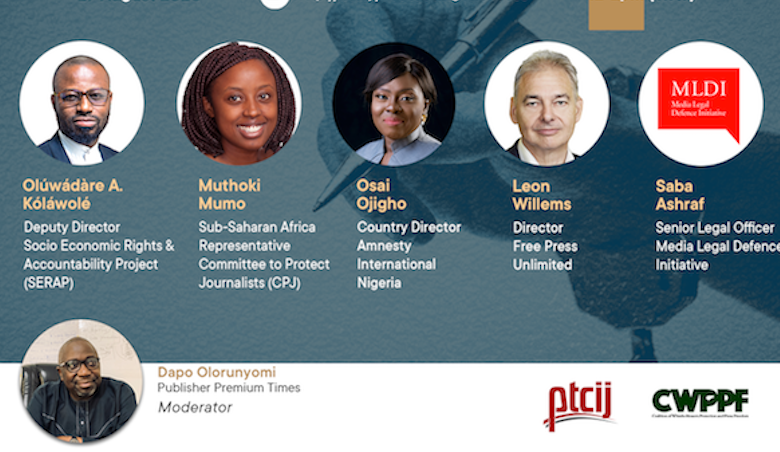Promoting Press Freedom, Premium Times’ Webinar Explores Needed Instruments

In light of the ongoing conversation on press freedom in Nigeria, panelists at a webinar on the topic explored the international and regional instruments for upholding press freedom.
The program was organized by the Premium Times Centre for Investigative Journalism (PTCIJ) and focused on global laws upholding the freedom of press and other related challenges.
Held on August 27, it had Oluwale Kolawole, deputy director of Socio Economic Rights and Accountability Projects (SERAP); Muthoki Mumo, Sub-Saharan African Representative Committee to Protect Journalists (CPJ), and Osai Ojigho, Country Director, Amnesty International Nigeria as speakers.
Other speakers were Leon Willems, Director Free Press Unlimited and Saba Ashraf – Senior Legal Officer, Media Legal Defence Initiative, while Premium Times publisher, Dapo Olorunyomi moderated.
In recent times, the Nigerian media has recorded various cases of assaults on journalists and stifling press freedom.
During the program, panelists shared their thoughts on their growing trend and the various statues available for journalists, home and abroad.
Osai Ojigho, while speaking, noted that a collective demand and campaign for the implementation of a decision by the judiciary require active participation.
She also highlighted the issue of fake news, how it is disseminated and how it is being fact-checked.
The attempts at fake news should not be an excuse to defile human rights, and the Nigerian government needs to be more proactive in sharing information.
“We can’t talk about press freedom without talking about human rights,” Ojigho added.
Meanwhile, Mumo of CPJ pointed out that the pandemic has rippled through every aspect of human lives and has had detrimental effects on journalists in sub-Saharan Africa.
“Journalists have a very important job in bridging the discourse between the high power and the people,” he said.
The issue of press freedom restrictions have reached several stages in various countries around the world and its impact on these media environments are glaring.
Leon Willems, Director Free Press Unlimited said that in Bangladesh, 60 per cent of newsrooms have stopped publishing [while] seven per cent of media houses have gone bankrupt, globally.
“There is a collective effort needed to look into new ways of putting new economic streams in place for independent journalism.
“Independent journalism is a vital pillar of democracy; however, it is disappearing,” he added.
Kolawole Oluwadare of SERAP believeas that the norms in Nigeria and Africa are not freedom of expression norms.
He called on strategy for each case being filed. “This requires a short term and a long term strategy and that is a strategy currently adopted for the NBC code,” he said.
HumAngle reports that in a thesis published by Kemi Busari, a Nigerian journalist, he explained how a total of 148 attacks were recorded between June 2015 and May 2019 in Nigeria.
Many journalists were also tried under the cybercrime act, he noted.
Speaking earlier at the program, Dapo Olorunyomi stated that journalism is all about the accountability of the democratic process.
“Media freedom will have no meaning if we don’t see it in other forms of freedom,” the Premium Times publisher said.
Support Our Journalism
There are millions of ordinary people affected by conflict in Africa whose stories are missing in the mainstream media. HumAngle is determined to tell those challenging and under-reported stories, hoping that the people impacted by these conflicts will find the safety and security they deserve.
To ensure that we continue to provide public service coverage, we have a small favour to ask you. We want you to be part of our journalistic endeavour by contributing a token to us.
Your donation will further promote a robust, free, and independent media.
Donate HereStay Closer To The Stories That Matter




